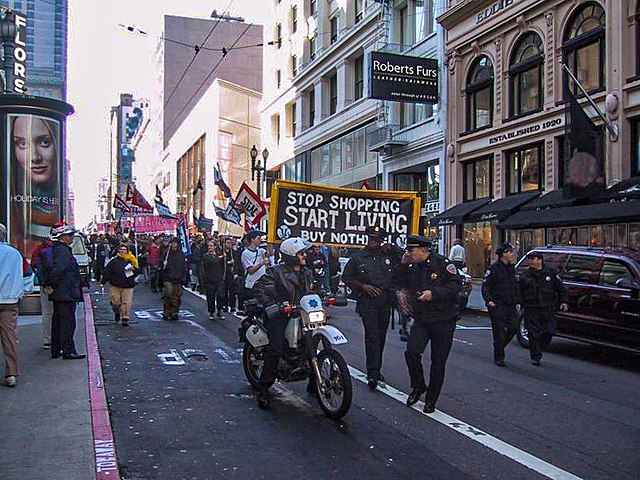Buy Nothing Day
“Buy Nothing Day,” a day established in Canada, is when people refrain from purchasing any goods in order to deliver a message about consumerism. Consuming items to an immoderate level is detrimental to our world because it exhausts our natural resources, increases labor and is ultimately destroying our surroundings. It is binding on us, as privileged people living in a developed country, to educate ourselves on the consequences of this issue and further think about ways to combat it. “Buy Nothing Day” is essential as it advocates for ethics when considering labor used for product production and forces people to think about the environment while shopping.
What exactly is overconsumption? By definition, it is “the action or fact of consuming something to excess.” While we have the luxury of even considering the purchase of non-essential items, there are people living on the other side of the world who struggle having three meals a day. Most of the products we buy are actually made in ways we wouldn’t morally agree with. Many companies unethically mass produce a lot of their items in countries like Bangladesh, where people are forced to work in sweatshops to make a living. It is estimated that 170 million people are engaged in child labor, producing materials to satisfy the demands of consumers in the U.S., Europe and more. The repeated purchase from these companies is supporting and upholding these inhuman practices of product production. Essentially, the more people keep buying and buying, the more companies will resort to this in order to make revenue. If this were to gradually change, this labor market would slowly decrease as customer demands do. In addition, the economy would not be disrupted. When administering a “Buy Nothing Day” nationwide, the country is partly educating people about ethical consumption behavior. If this becomes a formal practice, kids and young adults will eventually learn the importance of how the activity of over-consumption is immoral and indirectly contributes to indecent labor methods. “Buy Nothing Day” requires us fortunate consumers to develop a more selfless mindset when thinking about what we might buy as we get reminded of people who don’t have such a convenient way of living.
When we go to the store, many of us usually have in mind what we need to buy and then we end up getting many other items we hadn’t originally planned. And while it may seem harmless, with every other person also doing this, we are overconsuming excessively. The U.S. alone is responsible for almost 20% of the world’s energy consumption even though other underdeveloped countries are left behind with a deficit of resources. The reason we over consume is because we automatically assume that there is plenty left. But the reality is that some scientists have speculated that the decline of certain natural resources is evident as we are so quick to take materials from the environment. Processing products requires the introduction of pollution and the extraction of raw materials, draining the planet’s life support systems for living organisms including ourselves. There will be an end to many resources someday which is what “Buy Nothing Day” is suggesting consumers to think about. With the theme of conservation this day holds, people recognize that our environment is being overly tainted and as a result, destroying the habitat for all living things.
Now, some people may ask, what’s so wrong with consumerism? What’s so wrong with buying items for myself? The act of buying goods is not bad at all. It’s that act of buying needless items to a large extent. And, yes, it is beneficial to a point, as this sustains our economy which affects everyone poor or wealthy. But consumers tend to fall into traps set by companies to get them to actually consume more. For example, at fast food chains, they will sell meals that come with an extra large drink or fries that are cheaper if you were to buy them separately. While that is a good deal, you are buying way more than you actually need, meaning they used more resources to make something you may not even finish. The same concept is held when companies keep producing newer models of the same product. Often, older versions of a specific product are designed to live short and subsequently, make consumers consider buying a newer one. This encourages increased waste and continuous product development which, again, requires many resources and unregulated labor. If on “Buy Nothing Day,” we practice resisting the urges these companies carry, we can make a huge impact on the world.


